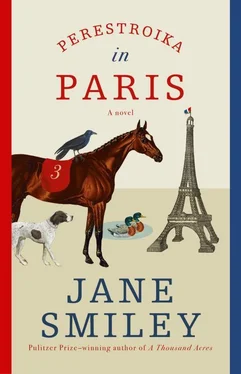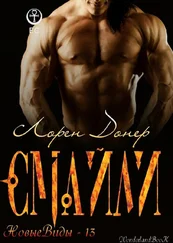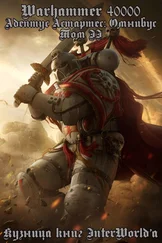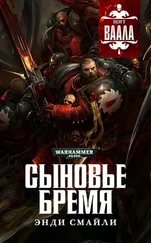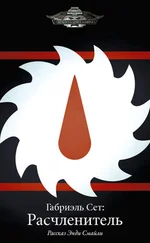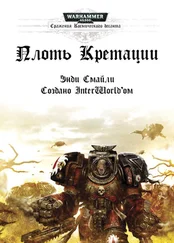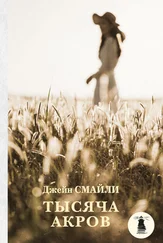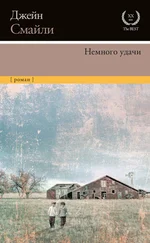There Paras was, her tail up and her ears pricked, her neck arched. Through the ironwork, Frida said sharply, “Shut up!”
Paras said, “Oh, you found my purse.” She came over and put her nostrils through the fence.
In her heart, Frida rejected the idea that this was Paras’s, or solely Paras’s, purse. Wasn’t she the one who had carried those bags back and forth from Jérôme’s market? Wasn’t she the one who understood that currency was to be exchanged, and thereby benefit the larger economy of Paris? Wasn’t she the one who had hidden and cared for the purse? Left to her own devices, Paras would have dropped the purse somewhere, having lost interest in it. That Paras should claim the purse was unjust, Frida thought. However, it was also true that Jacques had once found a very small purse, belonging to a man, lying open on the sidewalk. He and Frida had walked all the way to the Marais and returned the thing to the man, who had been very grateful, and given Jacques a sizable sum in return—enough for them to spend a lovely night in a pleasant room, where they both took showers and Jacques ordered a tray of food. It was not as though Frida didn’t understand ownership—only that she felt that, in this case, ownership was unfair. She said, “Yes. I did. It’s aged very nicely, I think. But you are making a spectacle of yourself. The gendarmes could be here any minute. I had a close call this morning, over in Passy.”
“I don’t see how we could find a nicer or more private spot than this. The boy is a decent sort, much smaller than a jockey, and he serves a lovely bowl of soaked split peas. Look over there—a little alcove where you could curl up, protected on three sides. I think it’s a nice compromise between inside and out. I am sure he will let me out in the evenings, and with all of these bushes, you could climb over.”
“Or dig under,” said Frida.
Frida flexed her very powerful front feet. She hadn’t had an enjoyable and challenging dig in a while.
When Étienne entered the upstairs library to retrieve his horseback-riding book, he immediately saw Kurt unconscious on the armoire. Owing to months of excellent provisions, Kurt was rather large, and Étienne was startled by his appearance. Of course, he knew that there were rats in the house—he could hear them late at night and early in the morning. But the only rats Étienne had ever seen were pictures in books. Those rats were thin and sinister-looking, with aggressive whiskers, narrow eyes, pointed noses, and bad intentions. This rat had a shiny, dusky coat. His whiskers did twitch, but more as a cry for help than as a threat. He looked, in fact, like a pet. Étienne went over to him and touched his fluffy white belly. It was silky. There was no odor. He stroked the belly. Kurt opened his eyes.
Kurt was intimately familiar with Étienne, in a way that Étienne was not with him. Once, against his father’s, Conrad’s, express orders, he had sat for quite a long time in the moonlight on the foot of Étienne’s bed, watching him sleep. Étienne turned this way and that way, made human noises, once even sat up and lay down again without opening his eyes. Kurt had seen Étienne eating, bathing, helping Madame de Mornay, reading, staring out the window, washing up, going out, and coming back in. He had never seen Étienne doing a threatening thing, and so, when Kurt opened his eyes at Étienne’s touch, he did not feel fear. He allowed the petting to go on, then sat up and yawned, which made Étienne laugh. The piercing noise was gone; Kurt’s world resumed its usual sensory identity. Étienne, after pausing, now began to stroke Kurt’s back, along the spine. After allowing this for what he considered the proper time, Kurt dipped his head in a little bow of thanks, and scurried across the armoire, over the back of one of the covered chairs, and into his tunnel. Étienne watched him for a moment, then found his book.
The digging was going very well—the ground was loamy and wet, and the roots weren’t terribly intertwined. It took Frida only a few minutes to make a hole deep enough to push the purse through; Paras grabbed it with her teeth and dragged it under the fence. It did stink, she thought, wrinkling her nose. Dogs were so peculiar, in their preference for rotten over sweet. Frida dug and dug, achieving a kind of whirling rhythm; finally, she saw that she could safely crawl under the fence, avoiding the pointed tips of the iron bars. Of course, there would be maintenance—there always was with a hole—but the freedom to escape was worth preserving. She stood up and shook herself. Dirt flew everywhere. Then she inspected the courtyard. She sniffed all along the base of the house, and the steps, and the base of the fence. She sniffed the air. The place smelled of age and cats, birds and their nests, dead leaves, and rotten grass. It smelled of isolation, but not filth, like the alley she had lived in after Jacques died. Perhaps because of the effort and pleasure of digging, she did not feel as glum as she had before. She investigated the alcove. She lay down in it, and she decided that it would do for now. In the meantime, Paras continued to walk around until, finally, she sought out a patch of sunshine, went over to it, and lay down. Paras took a nap. Frida took a nap.
Madame de Mornay, too, was taking a nap. Madame’s window looked out onto the courtyard, but since she couldn’t see it, she could only touch the glass with her fingertips and imagine it—a graceful entryway, the brilliant brass gates wide open in the spring sunlight, the semicircular promenade curving past the steps, bordered with plots of flowers carefully tended by Clément, the gardener. An automobile was about to drive in—open top, black and silver. In it was her mother, wearing a gold velvet dress with beading all down the front, and a cloche hat with a waving feather. She would be taking Éveline for a little trip to Deauville—just a few days, to enjoy the ocean and the society of friends. Éveline had packed her own valise, and it was ready beside the door. They would eat fresh crabs in Trouville. In her sleep, she smiled.
During the week before Christmas, Jacques had been in the habit of locating himself and Frida not in and around the Place du Trocadéro or the Left Bank, where he felt relaxed and comfortable, but near the Galeries Lafayette during the day and in the Boulevard des Capucines in the evening. He would put on his oldest clothes. He played Christmas tunes and instructed Frida to shiver and shake even when it wasn’t very cold. She understood what Christmas was—bright lights and displays, pedestrians everywhere. People exclaimed about what an unfortunate dog she was, then came the clink-clink-clink of guilty coins in the bowl. Once in a while, someone had even taken them to a café and bought them supper—mostly soup, one time a lovely leg of lamb. Christmas was Jacques’s busy season, and though he had grumbled about the hassle and the gendarmes, he was happy afterward. Frida quite liked Christmas. Because of the extra funds, she had eaten many a slice of turkey or goose, occasional bites of foie gras, and some delicious cheeses. Jacques had sometimes bought what he called a bûche de Noël, but Frida had never had a taste—no chocolate for dogs, said Jacques.
This year, Frida waited and waited at the house on the Rue Marinoni to see what Christmas would bring, but by Christmas Eve day, there was still no sign of anything. When Frida mentioned Christmas to Paras, Paras had no idea what she was talking about. Paras was going out every night now, and she, too, had noticed that there were more lights and more humans around (she assured Frida that she was being very careful—there was an hour or two in the deep deep dark when the streets were as deserted as usual). Was Christmas like the Arc, the race most of the trainers and the horses talked about? Was Christmas like the Grand Steeple-Chase de Paris? Races were what horses, jockeys, trainers, and owners got excited about—they talked about them for weeks and months. No, said Frida, but she couldn’t explain any further. Raoul was not helpful—his explanation of Christmas was all about birds of various breeds mobbing and voicing, which was what humans seemed to be doing in the darkest time of the year, and in their most colorful plumage. He opined that it was a mass breeding ritual. However, and he thought Frida should note this, too, it was their most wasteful time of year, and for that he was thankful.
Читать дальше
